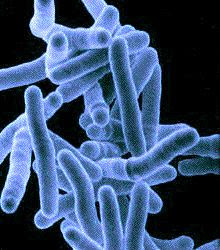
Tuberculosis is a chronic infectious disease caused by tubercle bacilli. It is known throughout the world, but it is more common in developing countries.
Tuberculosis is a specific disease which primarily affects lungs and causes pulmonary tuberculosis. It can also affect intestines, meninges of the brain, bones, joints, lymph glands, skin and other tissues of the body. Pulmonary tuberculosis is the most important form of tuberculosis which affects people.
Pulmonary tuberculosis is caused by mycobacterium tuberculosis an acid fast bacillus discovered by Robert Koch, a German scientist is 1882. Three types of tubercle bacilli are responsible for tuberculosis in people which include human type, bovine type and atypical or anonymous mycobacterium. The bovine strain affects cattle and other animals.
How it spreads
It is spread by droplet infection. When the droplets are expelled by tubercular patients through coughing, sneezing, talking and are inhaled by the healthy person.
By inhaling fine dust particles containing tubercle bacilli derived from dried sputum and other infected discharges thrown on floor, walls, furniture, or clothes, which after drying get converted into fine particles and mix with dust.
By handling sputum and other discharges of the tubercular patient.
by direct contact with the patient.
by consuming food and drinks contaminated with tubercle bacilli.
Infection symptoms last from a few months to a few years depending upon the host, parasite contact, and the severity of the infection.
Tuberculosis is a specific disease which primarily affects lungs and causes pulmonary tuberculosis. It can also affect intestines, meninges of the brain, bones, joints, lymph glands, skin and other tissues of the body. Pulmonary tuberculosis is the most important form of tuberculosis which affects people.
Pulmonary tuberculosis is caused by mycobacterium tuberculosis an acid fast bacillus discovered by Robert Koch, a German scientist is 1882. Three types of tubercle bacilli are responsible for tuberculosis in people which include human type, bovine type and atypical or anonymous mycobacterium. The bovine strain affects cattle and other animals.
How it spreads
It is spread by droplet infection. When the droplets are expelled by tubercular patients through coughing, sneezing, talking and are inhaled by the healthy person.
By inhaling fine dust particles containing tubercle bacilli derived from dried sputum and other infected discharges thrown on floor, walls, furniture, or clothes, which after drying get converted into fine particles and mix with dust.
By handling sputum and other discharges of the tubercular patient.
by direct contact with the patient.
by consuming food and drinks contaminated with tubercle bacilli.
Infection symptoms last from a few months to a few years depending upon the host, parasite contact, and the severity of the infection.
No comments:
Post a Comment